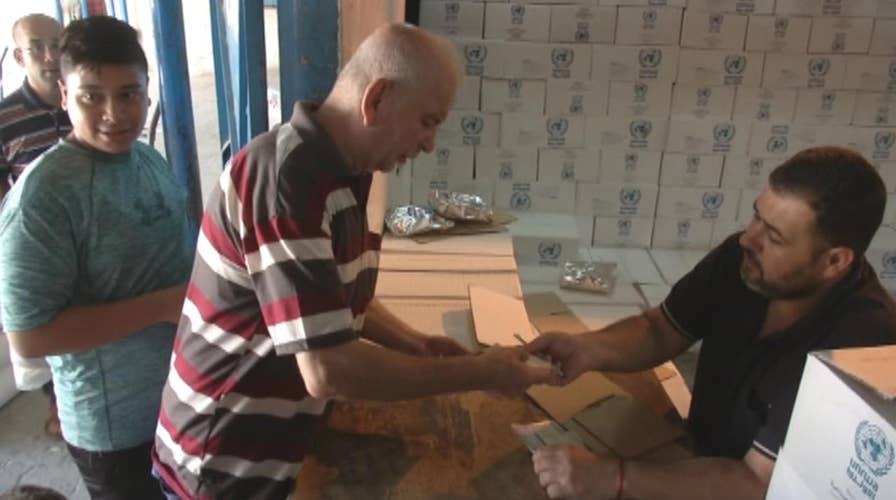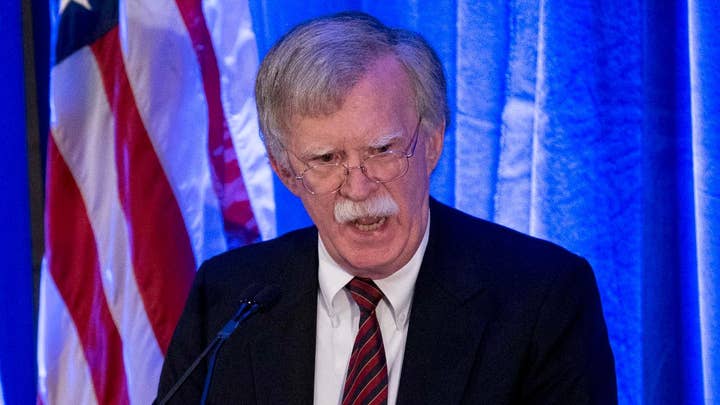Palestinians face the prospect of much less US aid
The Trump administration cuts its $300 million yearly contribution to the United Nations Relief and Works Agency, citing a disproportionate share of the burden and an endlessly expanding recipient pool; Trey Yingst reports from the West Bank.
UNITED NATIONS – As the Trump administration realigns its stance in the Middle East to embrace a stronger pro-Israel outlook, at the United Nations the opposite is happening: a U.N. bloc of developing countries has decided to hand Palestine a key leadership role, raising concerns that a push for full member status is not far behind.
The U.S. on Monday announced that it is closing the office of the Palestine Liberation Organization office in Washington, citing its failure to engage in peace talks and its attempts to get the International Criminal Court to prosecute Israel for war crimes.
“The United States will always stand with our friend and ally, Israel,” National Security Adviser John Bolton said during a speech to the Federalist Society. “The Trump administration will not keep the office open when the Palestinians refuse to take steps to start direct and meaningful negotiations with Israel.”
TRUMP ADMINISTRATION CLOSING PLO MISSION IN WASHINGTON
At the U.N., U.S. Ambassador Nikki Haley has been aggressive in cracking down on anti-Israel bias and demanding that terrorist groups like Hamas and Hezbollah be called out for violence. Israel is frequently the subject of the ire of a number of U.N. agencies, which often dedicate lengthy resolutions and reports to criticizing Israeli actions -- but the U.S. contends that the body glosses over or outright ignores crimes by Palestinians.
The U.S. has also infuriated some member states, particularly some Arab countries, by yanking its $360 million-a-year funding to the U.N. Palestinian refugee agency (UNRWA), declaring Jerusalem to be the capital of Israel and moving its embassy there. Haley has brushed off the outrage and told opponents to put their money where their mouths are.
“Don’t blame us for cutting aid. Don’t blame us for saying that we think UNRWA is political, and that it needs to be reformed. If you think it’s fine, go: you pay for it,” Haley said last week at a press conference.
But the elevation of Palestine to the G77 leadership -- a bloc of 135 developing countries including countries such as Saudi Arabia, Iran, Cuba, China and Venezuela -- raises the specter that Palestinians could soon push to be recognized as an independent member state, something that would likely be vetoed by the U.S. Currently, Palestine is recognized by the U.N. as an observer state, but not a full member.
A U.N. diplomat said the Palestinians will likely use their new platform to look to change their status from observer to member status.
The U.S. has condemned the move to elevate Palestine to G77 leadership, saying it is being treated like a state.
“The United States strongly disagrees with the Group of 77’s decision to make the Palestinian delegation the Chair of the G77 beginning in January 2019,” a U.S. official said.
“The United States does not consider the Palestinians to be a State, and believes that it is inappropriate for the Palestinians to assume this role in the UN. We urge members of the G77 to reconsider their choice of leadership for the coming year.”
“The goal of the Group of 77 originally was to facilitate the economic advancement of underdeveloped nations,” Israeli Ambassador Danny Danon told The New York Times, which first reported on the G77’s decision in July. “It is unfortunate that it will now become a platform for spreading lies and incitement. This will not promote the G-77’s goals, and encourages the Palestinians to not engage in negotiations for peace.”
HALEY: TRUMP'S ISRAELI-PALESTINIAN 'DEAL OF THE CENTURY' CAN HAPPEN IF ABBAS COMES TO THE TABLE
The Palestinians are making little secret that they are maneuvering for full member status at the U.N.
“They’re still denying we are a state,” Palestinian representative Riyad Mansour told the Times. “We walk like a state. We quack like a state. Therefore we are a state.”
Anne Bayefsky, director of the Touro Institute on Human Rights and the Holocaust, told Fox News that the decision marked a snub to the U.S. and to the West in general.
“Choosing the non-state of ‘Palestine’ as the head of a bloc of states that forms the majority of UN members represents one over-arching message to the United States - and the Western world in general: the proverbial middle-finger,” she said.
She warned that the G77 is now likely to be turned by the Palestinians “into a private fiefdom.”
“It's an unfortunate development all around - but in particular, it makes a mockery of democratic states continuing to foot the bills of the United Nations when its operations have taken one more step in the direction of chaos, non-cooperation, and violence,” she said.
Despite the deteriorating relationship between the U.S. and the Palestinians, the Trump administration is still hoping for what Trump has said would mark a “deal of the century” to solve the crisis, but has repeatedly said the ball in in the Palestinians’ court.
“I will tell you again, for the good of the Palestinian people, the region, the international community, we have to put pressure on [Palestinian Authority President Mahmoud] Abbas, and say, it’s time. It’s time for a better life for Palestinians,” Haley said. “And only he can deliver that.”






